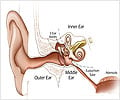A new study on mice, conducted by researchers at the Université de Montréal Department of Psychology, has provided an insight into how the brain identifies specific sounds in a noisy environment.
Researcher Alex Martin has credited the ears’ ciliated cells and its different sensitivities for the brain’s ability to identify specific sounds distinctly in a noisy environment. The team of researchers at the Université de Montréal Department of Psychology arrived at this conclusion after their new study on mice.
"These cells identify the frequencies that make up a particular sound, but also the spectrum of different frequencies that blend together. That is why we can identify different instruments playing the same note," Alex Martin said.For example, during a concert, when the sound of the crowd mixes with several instruments, the brain can still identify the specific notes played by the trumpet, the violin or any other instrument in the orchestra.
Still, Martin wanted to know the impact of background noise on the spatial sensitivity of auditory neurons.
So, he conducted a study, in which he placed rats in a partially echo-free, sound-proof chamber and simultaneously played two types of sounds: Gaussian sound (containing all frequencies) of 25 decibels and a pure sound (made up of one frequency).
He found that auditory neurons respond to a pure sound even if there is background noise.
Indeed, 71 percent of neurons don't change their response rate while 16 percent are excited by the sound and demonstrate increased sensitivity.
Advertisement
The study is soon to be published in the journal Brain.
Advertisement
TAN/M












